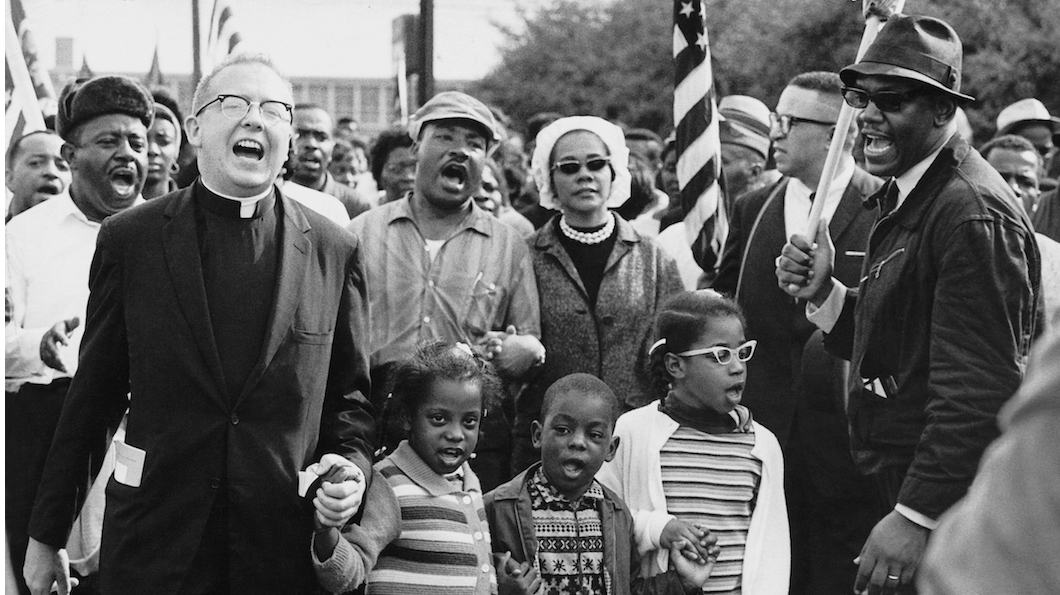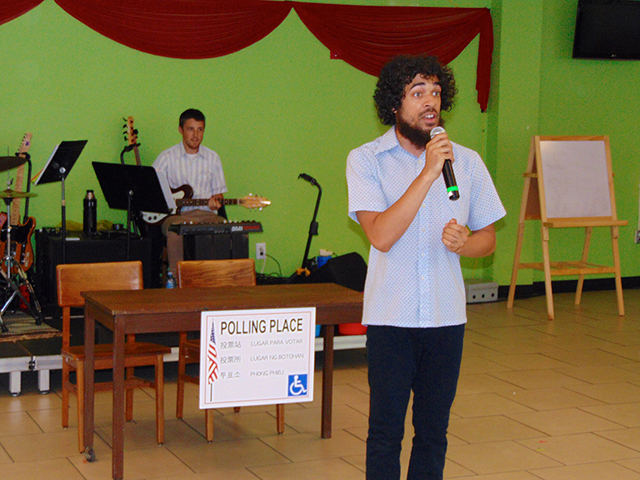
Philly play connects civil rights struggles to importance of voting today
Photo of the Selma to Montgomery march in 1965.
Throughout the week of the Democratic National Convention in Philadelphia the nonpartisan good government group the Committee of Seventy is putting on a play about the battle for voting rights. On Tuesday morning, three actors and two musicians played “Voices of Voting” to a packed house at the Science Leadership Academy in the Logan Square neighborhood of Center City.
The audience was largely comprised of middle and high school students from Philadelphia, who were regaled with stories of the key moments in the civil rights struggles of the 1960s. “Voices of Voting” showcases the Selma-to-Montgomery marches and the Edmund Pettus Bridge, but it also interlaces contemporary references to local events and figures to underscore the importance of voting today both in presidential and local races.
Written by Philadelphia playwright David Bradley, “Voices of Voting” makes heavy use of the Made in America Music Festival—a two-day music event in Philly masterminded by rapper Jay-Z—as an example of what can be won with power. If enough young people demand the music they can overcome the concerns of, say, crotchety older neighbors. Imagine what they could win if they came together to vote.

Scene from “Voices of Voting,” featuring Scott Ziegler and Anthony Martinez-Briggs.
“Our generation grew up hearing how they are all crooks and don’t trust the government,” the script reads near the end of “Voices of Voting,” as one of the characters who earlier resisted the call of the ballot box changes his mind. “So I’m at work doing the usual complaining minimum wage-too-low, tuition-at-community-college-too-high, and this guy I work with—a normally really quiet guy—says that’s because we don’t show up, we don’t vote. How will the changes we want happen? We don’t put ourselves out there so we have no power.”
The students engaged with the play in a lively fashion, peppering the actors and Bradley with questions afterwards. They were struck by the inequity of the voter suppression methods displayed in the play—one child, confused by the notion of a poll tax, asked how much it costs to vote today. Others were struck by still-contemporary resonances. When told that white sheriffs would sometimes illegally detain black would-be voters if they drove to the polls, a girl noted that the police in her neighborhood just pull people over for no good reason today too.
For Bradley, the Democratic National Convention is the perfect time to showcase “Voices of Voting,” which is supported by Knight Foundation. Most of the kids attending his play won’t make it to the conventions, or sit through all the speechifying on television. But they are aware something momentous is going on, and he hopes they learn that they too can gain power if they come together, organize, and vote.
“We’re in this political moment and I think it’s really important to lift up the struggles and activism that people put forth to ensure the right to vote,” says Bradley after the show. “Let’s talk about the struggles to expand who we the people could be and help young people realize what voting does year after year to build our cities and neighborhoods.”
Jake Blumgart is a Philadelphia-based freelance writer. Email him via [email protected] and follow him on Twitter @jblumgart.